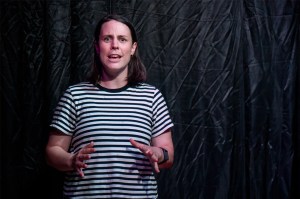It’s impossible not to love Vera Bradford-Shmulkin, the whip-smart Jewish-Korean-American child narrator of Vera, or Faith, Gary Shteyngart’s sixth novel, which is a masterclass in the author’s sardonicism, set in a frighteningly realistic near future.
School is awful and Vera’s world is on the brink of imploding because “Daddy and Anne Mom,” her stepmother, aren’t getting on, what with Igor’s evening “mar-tiny” habit and crumpling status as a “leftist intellectual.” The wider American world is in similar turmoil, with an escalating campaign for the Five-Three amendment. This calls for “exceptional Americans” who can trace their roots to before the Revolutionary War to get added voting weight, heightening tensions.
Vera, whose half-brother Dylan would be an exceptional American, is desperate to trace “Mom Mom,” her mysterious birth mother, who she thinks has cancer. It’s no wonder Vera’s pediatrician and her psychologist think she suffers from intense anxiety, despite presenting as a very bright ten-year-old. Admittedly, this all makes for a precocious and pretentious protagonist, but Shteyngart knows that readers will relate to Vera because “many of them were Vera,” as he told one interviewer. Her “Things I Still Need to Know Diary” is full of lists of words and phrases such as “neoliberal frog-march of the damned.”
The super-sharp child narrator is a trope beloved by authors who want to look at the world sideways. Miriam Toews uses it in her latest novel Fight Night, which sees nine-year-old Swiv try to track down her missing father, as did Henry James many decades ago in What Maisie Knew. Here, sticking to Vera’s close third-person perspective emphasizes the crazy geopolitics. The one flaw is that children are repetitive, and so are some of Vera’s lines, such as how Igor gets her to check people’s bookshelves to see if the spine has been cracked on an enormous book called The Power Broker.
The action takes place over a couple of months, mainly in Manhattan, where Vera and Dylan attend a highly selective public school. Given the joy that comes from the girl’s unique take on the world, it would be a shame to give too much away in such a slim novel; but Kaspie the AI-powered chess computer and Stella the talking car deserve special mention.
Shteyngart apparently wrote the novel in 51 days, and pays homage throughout to Vladimir Nabokov’s 1969 novel Ada, or Ardor. It makes an ideal entry point for anyone new to Shteyngart’s world because it’s all there, from the stand-in for the author himself to prophecies of where the world is headed. An enjoyable if somewhat alarming read.

























